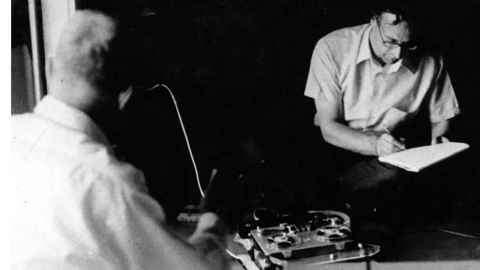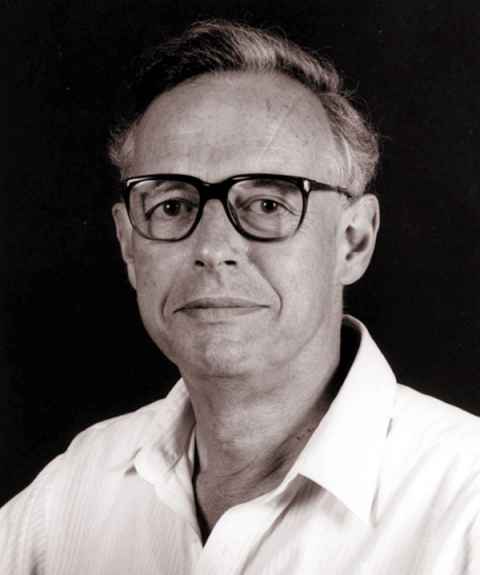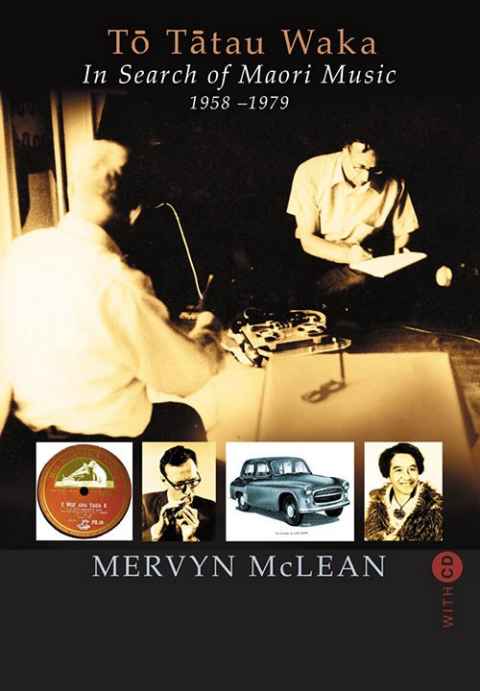Preserving the unique sounds of Aotearoa: Mervyn McLean
18 July 2022
Obituary: Mervyn Evan McLean (1930-2022), University of Auckland ethnomusicologist and founder of the Archive of Māori and Pacific Sound, leaves a priceless legacy.

The University of Auckland acknowledges Mervyn McLean, who passed away 8 July.
In 2006, Mervyn McLean published Pioneers of Ethnomusicology, an anthology of the discipline's multifarious influential figures and their accomplishments.
Writing always with a degree of understatement no longer common in the discipline however, he omitted any reference to himself, despite having long enjoyed an international reputation for his groundbreaking and sustained work on traditional Māori music.
Starting his fieldwork in Aotearoa New Zealand in 1958, six years before two of the four founding members of the Society for Ethnomusicology produced their seminal works – Alan Merriam's The Anthropology of Music, and Bruno Nettl's Theory and Method in Ethnomusicology – Mervyn focused on recording Māori waiata throughout the country, eventually recording 1,300 items at a time when few non-Māori knew of the existence of the many genres of sung and recited compositions. He later estimated his total distance travelled was 42,000 kms.
He was, quite literally, an ethnomusicologist before the word was in common use.
An adjunct of Mervyn's fieldwork, unusual at that time, was an explicit commitment to provide singers with a copy of their recordings, and also to give younger Māori generally a free copy on request, in the interests of providing future generations with access to waiata as a teaching resource.
And the desire to provide Māori with details of earlier recorded collections prompted him not just to publish annotated catalogues of collections – by the Māori Purposes Fund Board (1983), Radio New Zealand (1991) and the then National Museum (1993) – but also to distribute a copy free to every public library in the country.

In many of his publications, Mervyn was keen to use his knowledge and his recordings for the future benefit of Māori. Several of Mervyn's publications acknowledge his principal benefactor and mentor, Arapeta Awatere, and each of his books pays tribute to a long list of Māori singers and informants. Indeed, an entire book is devoted to one man, Kino Hughes who, at age 80, "set himself the task of recording for future generations all the songs he knew”.
However, Mervyn’s most enduring achievement and legacy was undoubtedly the founding and directing of the Archive of Māori and Pacific Music at the University of Auckland.
Funded from the Department of Anthropology's annual grant, throughout his 23-year tenure as director, the archive progressed from a collection of tapes in a technician's workshop to customised premises next to a language lab in the then newly built Human Sciences Building.
Largely through Mervyn's tireless advocacy among his colleagues, the archive grew within two decades to house the world's largest recorded collection of traditional music from the Pacific. More recently, the change of name to the Archive of Māori and Pacific Sound acknowledges the many spoken and orated assemblages of Pacific-wide material included in its holdings.

Originally a depository of material for largely academic use, the archive is now a specialised collection unit within the University Library, with greatest use by Māori and Pasifika themselves.
In 1983, in cooperation with an international team, Mervyn led the archive in co-ordinating a UNESCO-funded Territorial Survey of Oceanic Music, inviting established scholars to apply to survey the music of nominated parts of the Pacific experiencing rapid culture change.
Ten surveys were undertaken in what was the first such project within Pacific ethnomusicology to incorporate the training of local co-workers in recording and documentation, as well as immediate repatriation of copies of the recordings.
Mervyn once said that he wrote his autobiography Tō Tātau Waka: In Search of Maori Music 1958-1979 (AUP, 2004) in a matter of weeks, and that he was delighted that Māori descendants of his informants, when contacted for photographs of their koro and kuia, readily supplied them for inclusion.
Such was the enduringly high reputation of his fieldwork, and such was the growing public interest in things Māori within the country. The book was Auckland University Press' best-selling volume for that year.
Largely through Mervyn's tireless advocacy among his colleagues, the archive grew within two decades to house the world's largest recorded collection of traditional music from the Pacific.
Ethnomusicology was, and is, a relatively small sub-discipline within anthropology at the University, residing collegially but always competitively with archaeology, social anthropology, and biological anthropology.
During Mervyn's time, Māori studies and linguistics were also part of the department, which as a whole, was solidly focused on Aotearoa New Zealand and the Pacific. It was pure luxury to be able to get an instant expert opinion on practically any aspect of Polynesian society or culture simply by walking along the corridor and knocking on the appropriate door. Many of Mervyn's publications acknowledge such collegial cooperation.
Mervyn made only two significant departures from a focus on Māori music. One was a period of fieldwork on Aitutaki and Mangaia, the other a chapter on the structure of Tikopian music in Raymond Firth's monograph Tikopia Songs. In 2007 the Department of Anthropology published Oceanic Music Encounters: the Print Resource and the Human Resource: Essays in Honour of Mervyn McLean.
During his "retirement", Mervyn continued to be active, broadening the scope of his publications even as his colleagues were tending to narrow their own research focus. Geographical diffusion of singing styles and musical instruments came under his scrutiny.
He first presented his accumulation of knowledge of the Pacific in Weavers of Song: Polynesian Music and Dance (1999), a major work unlikely to be repeated by a sole author. He further extended the scope of his Pacific research to embrace Polynesian origins and languages in his final major work Music, Lapita, and the Problem of Polynesian Origins (2014), incorporating data from linguistics and archaeology.
By all measures, this was a remarkable achievement for any author, but an achievement made more poignant by a statement appearing at the very end of the 231-page document: "Because the writer is now blind, this book has been necessarily dependent on the help of many people ...”
Moe mai, moe mai rā e te rangatira.
by Richard Moyle
Richard Michael Moyle is a retired New Zealand academic specialising in ethnomusicology of the Pacific and Australia. An extended version of this obituary will appear in the Journal of Polynesian Society.
Media contact
Julianne Evans | Media adviser
M: 027 562 5868
E: julianne.evans@auckland.ac.nz